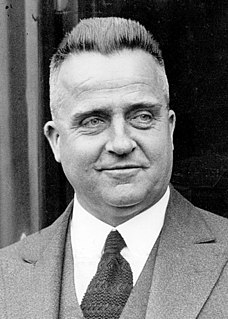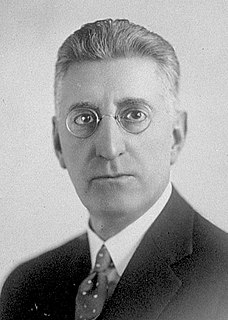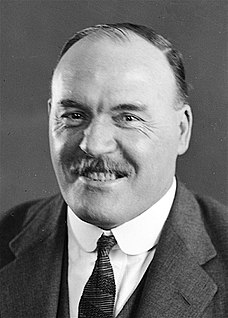Related Research Articles

Sir Bertram Sydney Barnsdale Stevens was an Australian politician who served as the 25th Premier of New South Wales, in office from 1932 to 1939 as leader of the United Australia Party (UAP).

Sir Thomas Rainsford Bavin, KCMG was an Australian lawyer and politician who served as Premier of New South Wales from 1927 to 1930. He was born in New Zealand and arrived in Australia at the age of 15, where he studied law and became a barrister. He served as personal secretary to Australia's first two prime ministers, Edmund Barton and Alfred Deakin. Bavin was elected to the New South Wales Legislative Assembly in 1917. He served two terms as Attorney General of New South Wales before leading the Nationalist Party to victory at the 1927 state election, in a coalition with the Country Party. His predecessor Jack Lang and the Australian Labor Party (ALP) defeated his government after a single term at the 1930 state election.

Reginald Walter Darcy Weaver was an Australian conservative parliamentarian who served in the New South Wales Legislative Assembly for 28 years. Serving from 1917 in the backbenches, he entered the cabinet of Thomas Bavin in 1929 as Secretary for Mines and Minister for Forests until he returned to opposition in 1930. Following the success of the United Australia Party in the 1932 election, Weaver returned as the Secretary for Public Works and Minister for Health in the Stevens ministry.

Lieutenant Colonel Sir Michael Frederick Bruxner was an Australian politician and soldier, serving for many years as leader of the Country Party in New South Wales. Born in the north of the state, Bruxner was educated at The Armidale School and started studies at University of Sydney but later dropped out to take up employment as a grazier and station agent in Tenterfield. After serving in the Citizen Military Forces from 1911, Bruxner enlisted into the Australian Light Horse upon the outbreak of the First World War in 1914. Serving with distinction in Gallipoli, Egypt and Palestine, he was promoted to lieutenant colonel and awarded the Distinguished Service Order.
Namoi, known as The Namoi until 1910 was an electoral district of the Legislative Assembly in the Australian state of New South Wales, created in 1880 and named after the Namoi River. It elected two members between 1891 and 1894. In 1894 it was abolished and partly replaced by Narrabri. In 1904, with the downsizing of the Legislative Assembly after Federation, Namoi was recreated, replacing Narrabri and part of Gunnedah. Between 1920 and 1927, it largely absorbed Gwydir and Tamworth and elected three members under proportional representation. In 1927, it was replaced by single-member electorates, mainly Namoi, Tamworth and Barwon. Namoi was abolished in 1950.
Albert Bruntnell was an Australian politician. He was a member of the New South Wales Legislative Assembly from 1906 until his death and held a number of ministerial positions in the Government of New South Wales. He was a conservative and at various times he represented the Liberal and Reform and the Nationalist parties.
Frederick Earle Winchcombe (1855–1917) was an Australian businessman and member of the New South Wales Parliament.
Members of the New South Wales Legislative Assembly who served in the 31st parliament held their seats from 1935 to 1938. They were elected at the 1935 state election, and at by-elections. The Speaker was Sir Daniel Levy until his death in 1937 and then Reginald Weaver.</ref>
Members of the New South Wales Legislative Assembly who served in the 30th parliament held their seats from 1932 to 1935. They were elected at the 1932 state election, and at by-elections. The Speaker was Sir Daniel Levy.</ref>
Members of the New South Wales Legislative Assembly who served in the 28th parliament of New South Wales held their seats from 1927 to 1930. They were elected at the 1927 state election, and at by-elections. The Speaker was Sir Daniel Levy.</ref>

The 1930 New South Wales state election was held on 25 October 1930. The election was conducted in single member constituencies with compulsory preferential voting. The election occurred at the height of the Great Depression and was a landslide victory for the expansionary monetary policies of Jack Lang.
Coogee, an electoral district of the Legislative Assembly in the Australian state of New South Wales, was created in 1927.
Ryde, an electoral district of the Legislative Assembly in the Australian state of New South Wales, has had four incarnations since it was first established in 1894. It has returned one member for most of its existence, except for the period 1920 to 1927 when it returned five members.
Albury, an electoral district of the Legislative Assembly in the Australian state of New South Wales, was created in 1880. It was abolished in 1920 when multiple member constituencies were established using the Hare-Clark single transferable vote. It was re-created in 1927 when the state returned to single member electorates.

The Bavin ministry was the 44th ministry of the New South Wales Government, and was led by the 24th Premier, the Honourable Thomas Bavin, MLA, in a Nationalist coalition with the Country Party, led by the Honourable Ernest Buttenshaw, MLA.

The Stevens–Bruxner ministry (1932–1935) or First Stevens–Bruxner ministry or First Stevens ministry was the 46th ministry of the New South Wales Government, and was led by the 25th Premier, the Honourable Bertram Stevens, MLA, in a United Australia Party coalition with the Country Party, that was led by the Honourable Lieutenant-Colonel Michael Bruxner, DSO, MLA. The ministry was one of three occasions when the Government was led by Stevens, as Premier; and one of four occasions where Bruxner served as Deputy Premier.

The Stevens–Bruxner ministry (1935–1938) or Second Stevens–Bruxner ministry or Second Stevens ministry was the 47th ministry of the New South Wales Government, and was led by the 25th Premier, the Honourable Bertram Stevens, MLA, in a United Australia Party coalition with the Country Party, that was led by the Honourable Lieutenant-Colonel Michael Bruxner, DSO, MLA. The ministry was the second one of three occasions when the Government was led by Stevens, as Premier; and second of four occasions where Bruxner served as Deputy Premier.

The Stevens–Bruxner ministry (1938–1939) or Third Stevens–Bruxner ministry or Third Stevens ministry was the 48th ministry of the New South Wales Government, and was led by the 25th Premier, the Honourable Bertram Stevens, MLA, in a United Australia Party coalition with the Country Party, that was led by the Honourable Lieutenant-Colonel Michael Bruxner, DSO, MLA. The ministry was the third of three occasions when the Government was led by Stevens, as Premier; and third of four occasions where Bruxner served as Deputy Premier.
Corowa, an electoral district of the Legislative Assembly in the Australian state of New South Wales had two incarnations, from 1904 until 1920 and from 1927 until 1950.
Gordon, an electoral district of the Legislative Assembly in the Australian state of New South Wales had two incarnations, from 1904 until 1920 and from 1927 until 1999.
References
- 1 2 "Sir Thomas Rainsford Bavin (1874-1941)". Former Members of the Parliament of New South Wales . Retrieved 3 May 2019.
- ↑ "Writ of election: Gordon". Government Gazette of the State of New South Wales (189). 1 November 1935. p. 4357. Retrieved 30 August 2020– via Trove.
- ↑ Green, Antony. "1935 Gordon by-election". New South Wales Election Results 1856-2007. Parliament of New South Wales . Retrieved 30 August 2020.